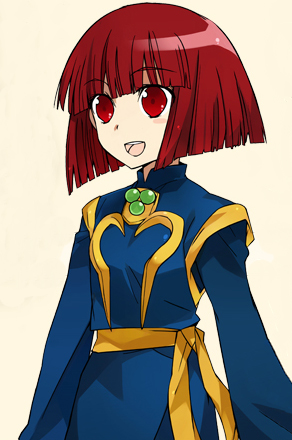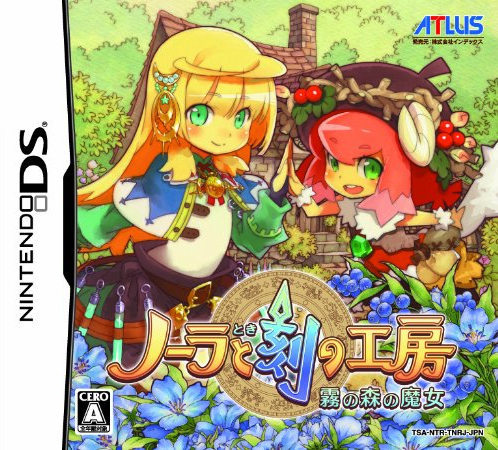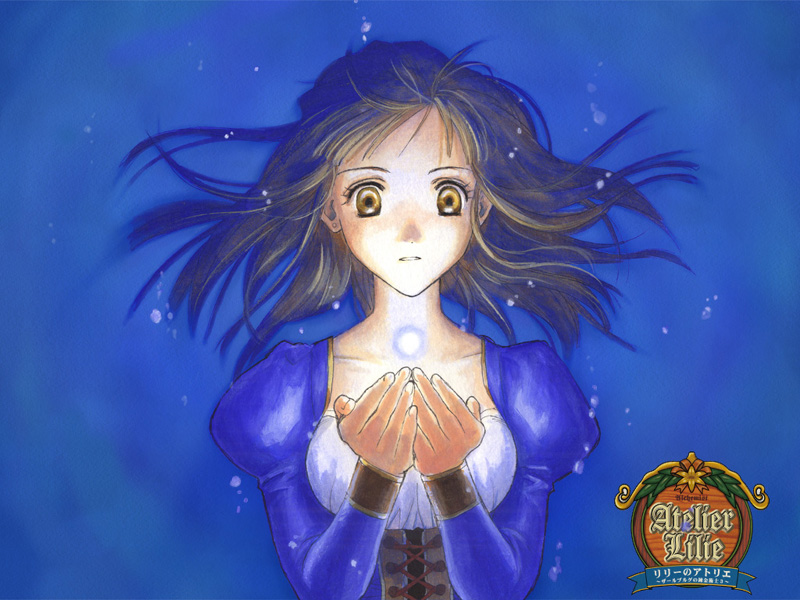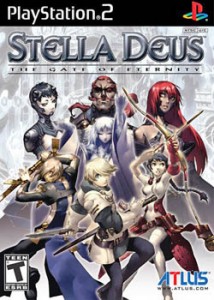 Or The Catacombs of Eternity, as I came to call it. But we’ll get to that in a moment.
Or The Catacombs of Eternity, as I came to call it. But we’ll get to that in a moment.
Stella Deus is a strategy RPG released in 2004. Developed by Pinegrow (I feel like I’ve played another game by them but I can’t remember which) and published by Atlus. Many have heard of it, few have played it.
I’ve had it in my collection for a while, but I always found something else to play when it was time to choose a new game. Then one day, shortly after finishing Persona 3, I looked at the cover and thought…wait, these character designs really look like those from P3. Really. So I did a little digging and yup, Shigenori Soejima did the designs for both games. And that’s what it took for me to finally put this game in and play it.
I’m prone to making snap judgments about games in the first few minutes. Sometimes that proves to be wrong, but often I’m right. Rarely, very rarely, I am both right and wrong at the same time. My initial impression about Stella Deus was that it was bland, boring, preachy and colorless and had some of the worst voice-acting I’ve ever heard in a video game in my life.
That’s all true, to a great extent. I’ll give the game props off the bat for the cast. Apart from the dull, goody-goody Spero, the barely-there Gallant, the annoying Tia and the idiotic Lumena, most of the cast is lively, funny and interesting. The overall voice-acting is so flat and awful it’s also easy to forget that a few voices are really well done, Grey’s and Adara’s for example. The battle system is also decent, definitely won’t disappoint fans of the strategy RPG genre. Plus the story is very simple and straightforward, which might be a plus or a minus depending on what kind of gamer you are. Since the story takes place in a world that is gradually being swallowed by a strange mist called Miasma, even the washed-out color palette is strangely appropriate.
Where does Stella Deus go wrong, then? Pretty much everywhere else. The story about trying to revive a fallen world is disgustingly cheesy and preachy. Much of the late-game dialogue is the usual “We’ll never give up!”-”Humans are brave and resilient!”-”Never give up hope!” stuff that you’ve heard about 5,000 times before. As usual the enemies are extremists who have lost all faith in humanity, and then there’s the usual evil deity…who wrote this scenario? Was s/he even trying? *yawn*
The music is meh, so I won’t even talk about it. Over the course of the game you get to visit a lot of towns and cities, but you never get to explore them and you almost never get to interact with ordinary townspeople. You know, the same townspeople you’re trying to save? Might be nice to get to know what they’re really thinking, get them on your side and stuff, don’t you think? What’s more, interacting with the world around usually leads to greater immersion in the game, giving the player more incentive to save the world and finish the game. As it is, it’s very easy to lose motivation and stop playing, because you really don’t care.
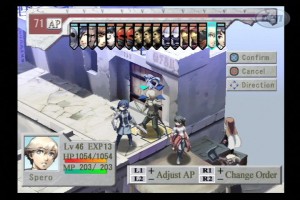 Most of gameplay time in an SRPG is made up of battles though, which is why it sucks when the battle system is really slow (FFTA2, I’m looking at you) or excessively complicated. Thankfully Stella Deus’s system is neither of these. In particular the enemies don’t waste time thinking, so their turns move relatively quickly. The system works like a regular one with a twist: every character starts their turn with 100 Action points that deplete when they move on the map or select an action. When they run out, you can’t move/act any more and have to end their turn. In the beginning it feels really restrictive, but once you get used to it it adds a fun element of planning and strategy. Will you spend your whole turn approaching the enemy? Will you approach, hit, and retreat? Will you hit them with magic, hit them physically and then heal your ally? There’s a lot of thinking to be done once you get into it.
Most of gameplay time in an SRPG is made up of battles though, which is why it sucks when the battle system is really slow (FFTA2, I’m looking at you) or excessively complicated. Thankfully Stella Deus’s system is neither of these. In particular the enemies don’t waste time thinking, so their turns move relatively quickly. The system works like a regular one with a twist: every character starts their turn with 100 Action points that deplete when they move on the map or select an action. When they run out, you can’t move/act any more and have to end their turn. In the beginning it feels really restrictive, but once you get used to it it adds a fun element of planning and strategy. Will you spend your whole turn approaching the enemy? Will you approach, hit, and retreat? Will you hit them with magic, hit them physically and then heal your ally? There’s a lot of thinking to be done once you get into it.
Then there are combos you can do with your party members, some of them extremely powerful. Before too long, your regular attacks will be hitting for more than the combos, but it’s still fun and flashy. Then there are Zone Effects, which are buffs and debuffs or status effects you automatically use on any enemy/ally who gets in range. By equipping ZSkills, you can, for example, boost the evasion of all allies in range/heal them a set amount every turn/cast darkness on enemies/cast Fear on enemies…etc, etc. etc. On top of all that, there are other stat-boosting/reducing skills you can equip on yourself to get stronger.
As you can tell, I had a lot of fun with the battle system. So much so that I quickly abandoned the main storyline to focus on the 100-level Bonus Dungeon called the Catacombs. It’s just 99 battles against powerful mooks, but somehow it’s the most addictive thing in the game. Seeing as it’s automatically unlocked right from the beginning, I believe the game makers anticipated that players would get into it really quickly. How else do you explain the fact that unless you’re a level or two higher than every boss you face, they will usually wipe the floor with your face?
Off to the Catacombs I went then, happily fighting my way down each level. Some of them were tough, I tell you, especially the oddly designed ones and the ones where your party is spread out all over the map. Whew! But clearing each level gives you a sense of achievement that the battles in the main game rarely do, plus you later get all these cool weapons and armor that you can use in alchemy. …Wait, alchemy? Why didn’t I mention that earlier, you ask? Because…alchemy in this game sucks. Without buying or downloading a guide, you won’t be able to make most of the good stuff except by chance. Also since you can only make goods one at a time, you’ll be selecting, deselecting and reselecting items over and over and over again until you’re sick of it. But it’s the only sure way to get really good weapons if you plan to go beyond level 50-ish of the Catacombs, so you have no choice. Blerrrrgh.
I had fun playing this though. The main game was below-average, but I got into the bonus dungeon and the battle system with a vengeance, so it was a worthy purchase. If you like SRPGs, like endless battles, like grinding and don’t mind bad voice-acting, I actually recommend this game. I don’t want a sequel, but I hope to find other games like it soon.
